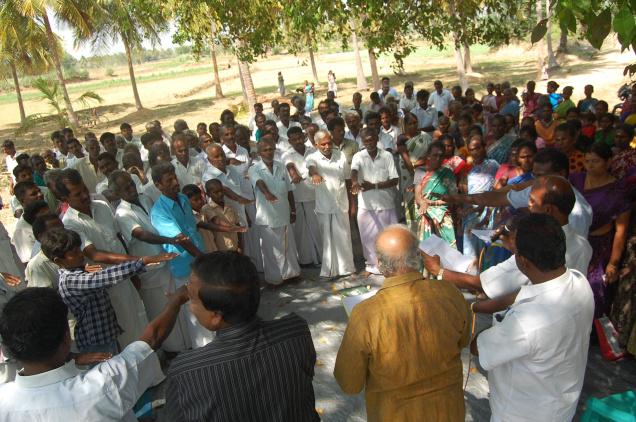
The project has been started in Edaiyapatti panchayat in Pudukottai
Pudukottai district is one of the driest regions in Tamil Nadu. The major crops under tank fed and open well irrigation system in this region in Tamil Nadu are paddy, millets, black gram and groundnut. Pulses like green, black and red gram are generally grown as a rainfed crops especially during summer.
But the harvested pulses do not fetch a good net income because of low yields due to pest and disease attack and poor processing facilities for value addition.
New project
The M.S. Swaminathan Research Foundation (MSSRF), working in Illuppur taluk, Annavasal Block, Pudukottai district, for the past seven years to improve the livelihoods of small farmers, designed a project for increasing the production of pulses in the region.
Accordingly the foundation successfully facilitated farmers from five panchayats in the taluk to form a farmers’ federation called South Vellar Agri Producer Organisation (SVAPO) in which 600 women and men farmers are paid shareholders.
Nearly 50 per cent of members are pulse growers whose seeds are much sought after by the state seeds department in a buy-back agreement.
“The concept of the Pulse Panchayat movement evolved spontaneously from the farming community in Edaiyapatti Panchayat. The community passed a resolution to put the maximum available land (474 acres) into pulse production in collaboration with National Pulse Research Station, Vamban, Government Agriculture department, and the foundation,” says Dr. R.S.Shanthakumar Hopper, Director, Ecotechnology, MSSRF.
Training
The farmers’ field school trained them to cultivate pulses with new climate-smart agriculture technologies like accessing quality seeds, pest and disease resistant varieties, soil health cards, seed treatment, foliar spray of DAP (Di Ammonium Phosphate) / pulse wonder (a booster with nutrients and growth regulators developed by the Tamil Nadu Agriculture University specifically for pulse crops), line planting, intercrops, integrated pest and disease management options and post harvest processing for drying etc.
The village knowledge centre provided timely and area specific information on climate smart agriculture technologies, market prices, animal health care, monsoon behaviour and government schemes through phone in programmes, voice and text messages to enhance pulse productivity and profitability.
Monsoon failure
“We faced severe monsoon failure in the year 2012 and 2013 but have managed to cultivate pulses in 406 acres. We are planning for a “pulse panchayat movement” of 1,000 acres in June-August and in September -December 2014 seasons in five panchayats especially on pulse seed production and consumption to combat protein hunger and adapting to drought confidently,” says Mr. Palaniyappan, president of SVAPO.
A significant achievement in this project is that as a result of a series of farmer participations in this movement was the move from traditional black gram (T9) variety towards Vamban 4 (VBN 4) variety which is resistant to virus and pest attack. In fact several farmers have preferred Vamban variety as it yields more and increases income for them.
“The experience in Maharashtra in organizing pani (water) panchayats has shown the value of group endeavour in water harvesting, storage, saving and sharing. India continues to import three to four million tones of pulses every year and thus the initiative of the Edaiyapatti panchayat in initiating a pulse panchayat movement is timely and important development in the history of pulses production in our country,” says Prof M.S.Swaminathan.
Recognition
The foundation was conferred the Bhoomijal Samvardhan Puraskar — National ground Water Augmentation award 2010 for promoting innovative practices of groundwater augmentation which complements the Pulse Panchayat Movement says Dr. R.S.Shanthakumar.
To know more farmers can contact Dr. Shanthakumar Hopper, mobile: 09445394394 and Mr.K. Thachinamurthy, Project Coordinator, M.S.Swaminathan Research Foundation, Samathanapuram, Illuppur – PO, Pudukkottai District, Tamil Nadu, email : thachinamurthy@gmail.com, Mobile 9626737207.
source: http://www.thehindu.com / The Hindu / Home> S & T> Agriculture> Farmer’s Notebook / by M. P. Prabu / May 21st, 2014